Entrepreneurship and Small Business: Comprehensive Analysis and Report
VerifiedAdded on 2020/10/05
|18
|5799
|143
Report
AI Summary
This report provides a comprehensive analysis of entrepreneurship and small businesses. It begins by defining entrepreneurship and small businesses, then explores different types of entrepreneurial ventures including large enterprises, small enterprises, and social enterprises. It examines the relationship between these ventures and various typologies of entrepreneurship, such as lifestyle and scalable typologies. The report highlights the similarities and differences between entrepreneurial ventures, focusing on aspects like profit, social objectives, and value creation. It then delves into the impact of micro and small businesses on the economy, providing statistical data on employment and turnover in the UK. The report also discusses the importance of small and startup businesses in the growth of the social economy and the characteristic traits and skills of successful entrepreneurs. Furthermore, it analyzes the aspects of entrepreneurial personality that reflect entrepreneurial motivation and mindset, and the role of background factors in fostering entrepreneurship. The report concludes with a summary of key findings and a discussion of the overall significance of entrepreneurship in the modern economy.

Entrepreneurship and small business
Paraphrase This Document
Need a fresh take? Get an instant paraphrase of this document with our AI Paraphraser
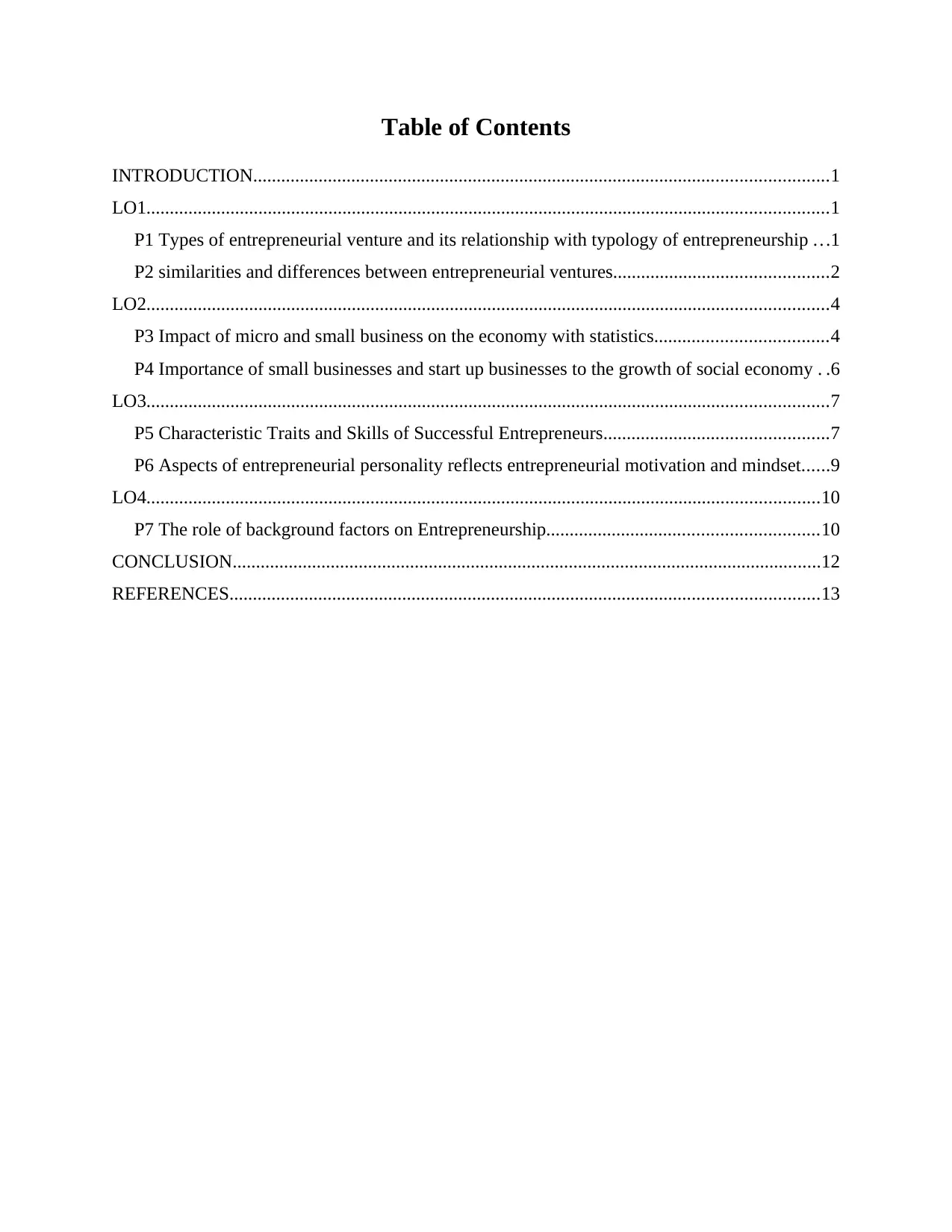
Table of Contents
INTRODUCTION...........................................................................................................................1
LO1..................................................................................................................................................1
P1 Types of entrepreneurial venture and its relationship with typology of entrepreneurship ...1
P2 similarities and differences between entrepreneurial ventures..............................................2
LO2..................................................................................................................................................4
P3 Impact of micro and small business on the economy with statistics.....................................4
P4 Importance of small businesses and start up businesses to the growth of social economy . .6
LO3..................................................................................................................................................7
P5 Characteristic Traits and Skills of Successful Entrepreneurs................................................7
P6 Aspects of entrepreneurial personality reflects entrepreneurial motivation and mindset......9
LO4................................................................................................................................................10
P7 The role of background factors on Entrepreneurship..........................................................10
CONCLUSION..............................................................................................................................12
REFERENCES..............................................................................................................................13
INTRODUCTION...........................................................................................................................1
LO1..................................................................................................................................................1
P1 Types of entrepreneurial venture and its relationship with typology of entrepreneurship ...1
P2 similarities and differences between entrepreneurial ventures..............................................2
LO2..................................................................................................................................................4
P3 Impact of micro and small business on the economy with statistics.....................................4
P4 Importance of small businesses and start up businesses to the growth of social economy . .6
LO3..................................................................................................................................................7
P5 Characteristic Traits and Skills of Successful Entrepreneurs................................................7
P6 Aspects of entrepreneurial personality reflects entrepreneurial motivation and mindset......9
LO4................................................................................................................................................10
P7 The role of background factors on Entrepreneurship..........................................................10
CONCLUSION..............................................................................................................................12
REFERENCES..............................................................................................................................13
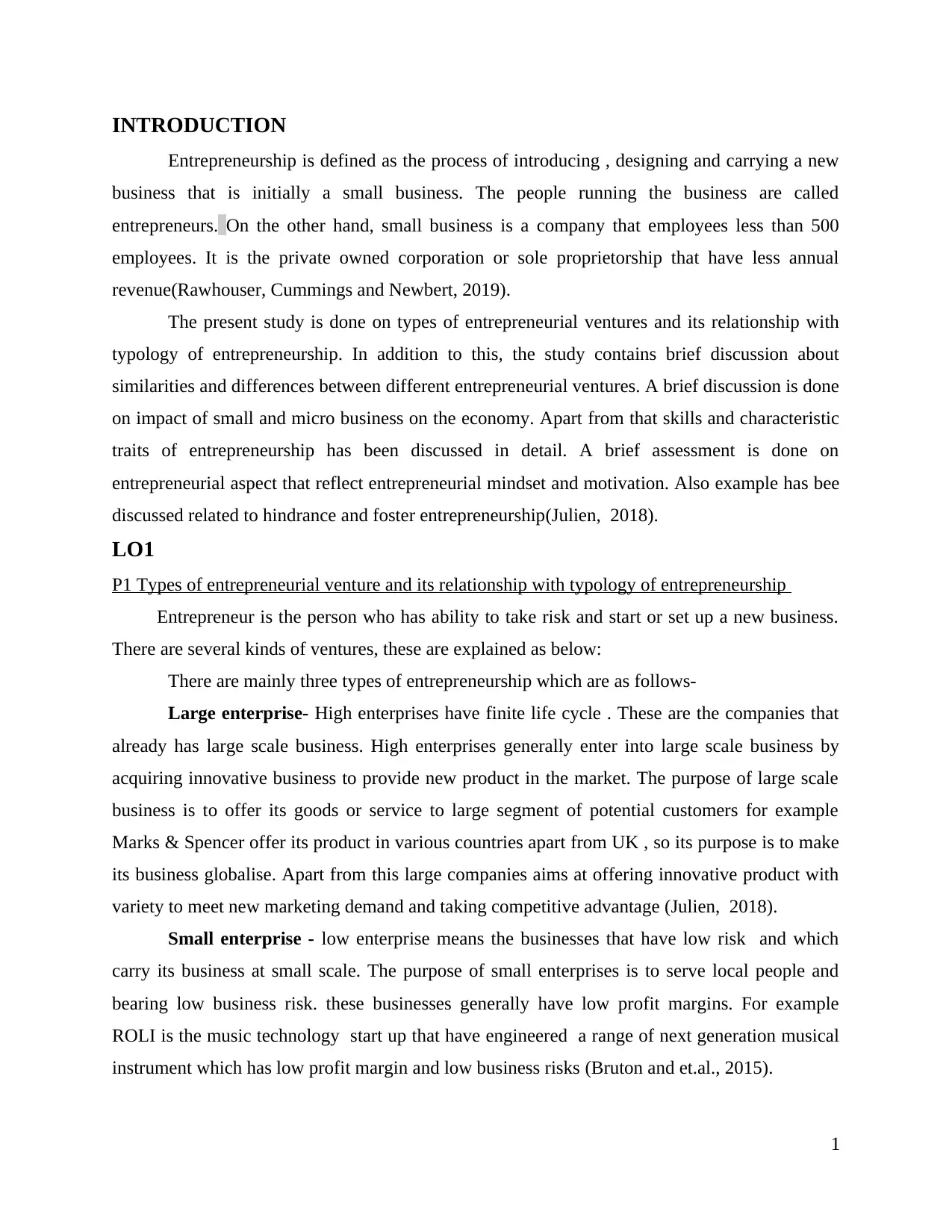
INTRODUCTION
Entrepreneurship is defined as the process of introducing , designing and carrying a new
business that is initially a small business. The people running the business are called
entrepreneurs. On the other hand, small business is a company that employees less than 500
employees. It is the private owned corporation or sole proprietorship that have less annual
revenue(Rawhouser, Cummings and Newbert, 2019).
The present study is done on types of entrepreneurial ventures and its relationship with
typology of entrepreneurship. In addition to this, the study contains brief discussion about
similarities and differences between different entrepreneurial ventures. A brief discussion is done
on impact of small and micro business on the economy. Apart from that skills and characteristic
traits of entrepreneurship has been discussed in detail. A brief assessment is done on
entrepreneurial aspect that reflect entrepreneurial mindset and motivation. Also example has bee
discussed related to hindrance and foster entrepreneurship(Julien, 2018).
LO1
P1 Types of entrepreneurial venture and its relationship with typology of entrepreneurship
Entrepreneur is the person who has ability to take risk and start or set up a new business.
There are several kinds of ventures, these are explained as below:
There are mainly three types of entrepreneurship which are as follows-
Large enterprise- High enterprises have finite life cycle . These are the companies that
already has large scale business. High enterprises generally enter into large scale business by
acquiring innovative business to provide new product in the market. The purpose of large scale
business is to offer its goods or service to large segment of potential customers for example
Marks & Spencer offer its product in various countries apart from UK , so its purpose is to make
its business globalise. Apart from this large companies aims at offering innovative product with
variety to meet new marketing demand and taking competitive advantage (Julien, 2018).
Small enterprise - low enterprise means the businesses that have low risk and which
carry its business at small scale. The purpose of small enterprises is to serve local people and
bearing low business risk. these businesses generally have low profit margins. For example
ROLI is the music technology start up that have engineered a range of next generation musical
instrument which has low profit margin and low business risks (Bruton and et.al., 2015).
1
Entrepreneurship is defined as the process of introducing , designing and carrying a new
business that is initially a small business. The people running the business are called
entrepreneurs. On the other hand, small business is a company that employees less than 500
employees. It is the private owned corporation or sole proprietorship that have less annual
revenue(Rawhouser, Cummings and Newbert, 2019).
The present study is done on types of entrepreneurial ventures and its relationship with
typology of entrepreneurship. In addition to this, the study contains brief discussion about
similarities and differences between different entrepreneurial ventures. A brief discussion is done
on impact of small and micro business on the economy. Apart from that skills and characteristic
traits of entrepreneurship has been discussed in detail. A brief assessment is done on
entrepreneurial aspect that reflect entrepreneurial mindset and motivation. Also example has bee
discussed related to hindrance and foster entrepreneurship(Julien, 2018).
LO1
P1 Types of entrepreneurial venture and its relationship with typology of entrepreneurship
Entrepreneur is the person who has ability to take risk and start or set up a new business.
There are several kinds of ventures, these are explained as below:
There are mainly three types of entrepreneurship which are as follows-
Large enterprise- High enterprises have finite life cycle . These are the companies that
already has large scale business. High enterprises generally enter into large scale business by
acquiring innovative business to provide new product in the market. The purpose of large scale
business is to offer its goods or service to large segment of potential customers for example
Marks & Spencer offer its product in various countries apart from UK , so its purpose is to make
its business globalise. Apart from this large companies aims at offering innovative product with
variety to meet new marketing demand and taking competitive advantage (Julien, 2018).
Small enterprise - low enterprise means the businesses that have low risk and which
carry its business at small scale. The purpose of small enterprises is to serve local people and
bearing low business risk. these businesses generally have low profit margins. For example
ROLI is the music technology start up that have engineered a range of next generation musical
instrument which has low profit margin and low business risks (Bruton and et.al., 2015).
1
⊘ This is a preview!⊘
Do you want full access?
Subscribe today to unlock all pages.

Trusted by 1+ million students worldwide
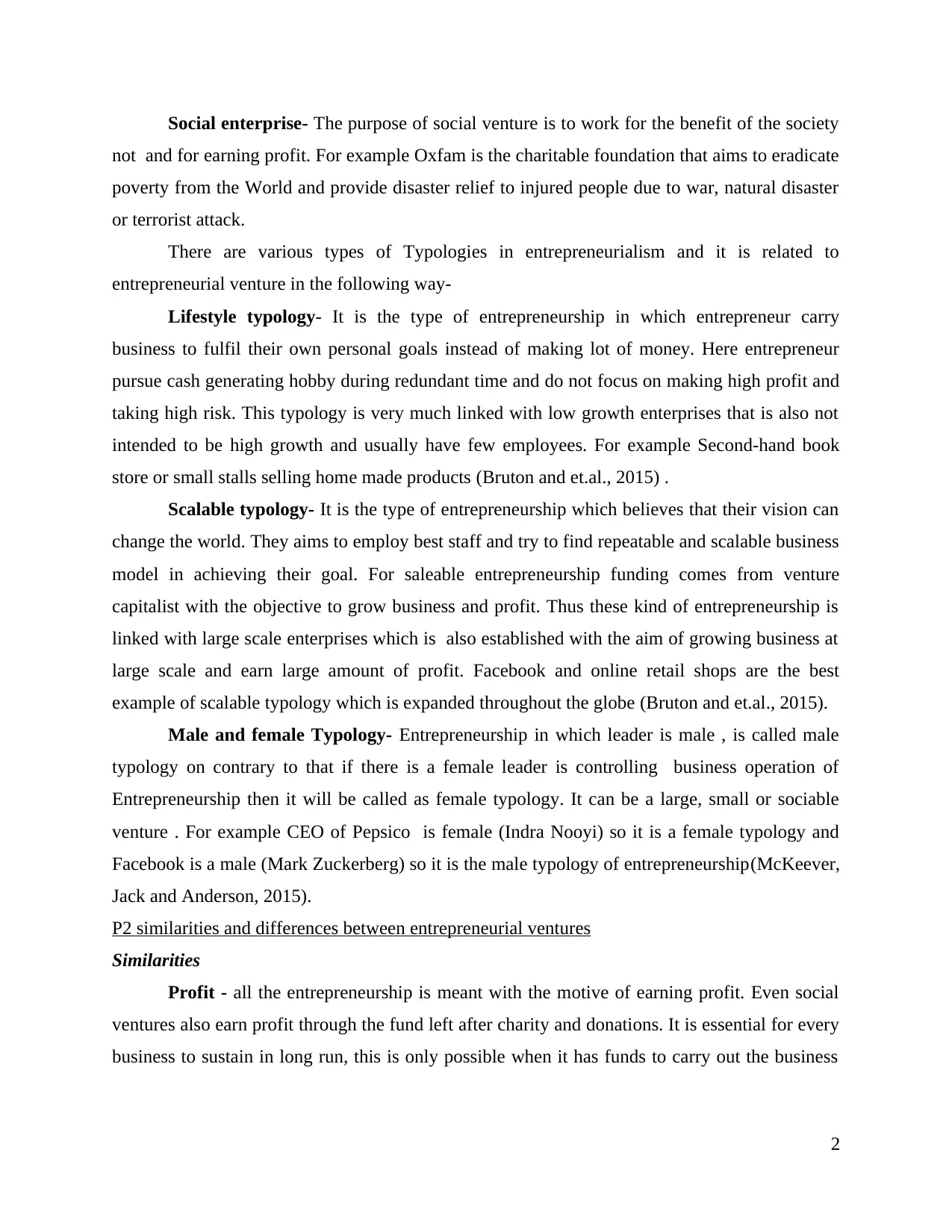
Social enterprise- The purpose of social venture is to work for the benefit of the society
not and for earning profit. For example Oxfam is the charitable foundation that aims to eradicate
poverty from the World and provide disaster relief to injured people due to war, natural disaster
or terrorist attack.
There are various types of Typologies in entrepreneurialism and it is related to
entrepreneurial venture in the following way-
Lifestyle typology- It is the type of entrepreneurship in which entrepreneur carry
business to fulfil their own personal goals instead of making lot of money. Here entrepreneur
pursue cash generating hobby during redundant time and do not focus on making high profit and
taking high risk. This typology is very much linked with low growth enterprises that is also not
intended to be high growth and usually have few employees. For example Second-hand book
store or small stalls selling home made products (Bruton and et.al., 2015) .
Scalable typology- It is the type of entrepreneurship which believes that their vision can
change the world. They aims to employ best staff and try to find repeatable and scalable business
model in achieving their goal. For saleable entrepreneurship funding comes from venture
capitalist with the objective to grow business and profit. Thus these kind of entrepreneurship is
linked with large scale enterprises which is also established with the aim of growing business at
large scale and earn large amount of profit. Facebook and online retail shops are the best
example of scalable typology which is expanded throughout the globe (Bruton and et.al., 2015).
Male and female Typology- Entrepreneurship in which leader is male , is called male
typology on contrary to that if there is a female leader is controlling business operation of
Entrepreneurship then it will be called as female typology. It can be a large, small or sociable
venture . For example CEO of Pepsico is female (Indra Nooyi) so it is a female typology and
Facebook is a male (Mark Zuckerberg) so it is the male typology of entrepreneurship(McKeever,
Jack and Anderson, 2015).
P2 similarities and differences between entrepreneurial ventures
Similarities
Profit - all the entrepreneurship is meant with the motive of earning profit. Even social
ventures also earn profit through the fund left after charity and donations. It is essential for every
business to sustain in long run, this is only possible when it has funds to carry out the business
2
not and for earning profit. For example Oxfam is the charitable foundation that aims to eradicate
poverty from the World and provide disaster relief to injured people due to war, natural disaster
or terrorist attack.
There are various types of Typologies in entrepreneurialism and it is related to
entrepreneurial venture in the following way-
Lifestyle typology- It is the type of entrepreneurship in which entrepreneur carry
business to fulfil their own personal goals instead of making lot of money. Here entrepreneur
pursue cash generating hobby during redundant time and do not focus on making high profit and
taking high risk. This typology is very much linked with low growth enterprises that is also not
intended to be high growth and usually have few employees. For example Second-hand book
store or small stalls selling home made products (Bruton and et.al., 2015) .
Scalable typology- It is the type of entrepreneurship which believes that their vision can
change the world. They aims to employ best staff and try to find repeatable and scalable business
model in achieving their goal. For saleable entrepreneurship funding comes from venture
capitalist with the objective to grow business and profit. Thus these kind of entrepreneurship is
linked with large scale enterprises which is also established with the aim of growing business at
large scale and earn large amount of profit. Facebook and online retail shops are the best
example of scalable typology which is expanded throughout the globe (Bruton and et.al., 2015).
Male and female Typology- Entrepreneurship in which leader is male , is called male
typology on contrary to that if there is a female leader is controlling business operation of
Entrepreneurship then it will be called as female typology. It can be a large, small or sociable
venture . For example CEO of Pepsico is female (Indra Nooyi) so it is a female typology and
Facebook is a male (Mark Zuckerberg) so it is the male typology of entrepreneurship(McKeever,
Jack and Anderson, 2015).
P2 similarities and differences between entrepreneurial ventures
Similarities
Profit - all the entrepreneurship is meant with the motive of earning profit. Even social
ventures also earn profit through the fund left after charity and donations. It is essential for every
business to sustain in long run, this is only possible when it has funds to carry out the business
2
Paraphrase This Document
Need a fresh take? Get an instant paraphrase of this document with our AI Paraphraser
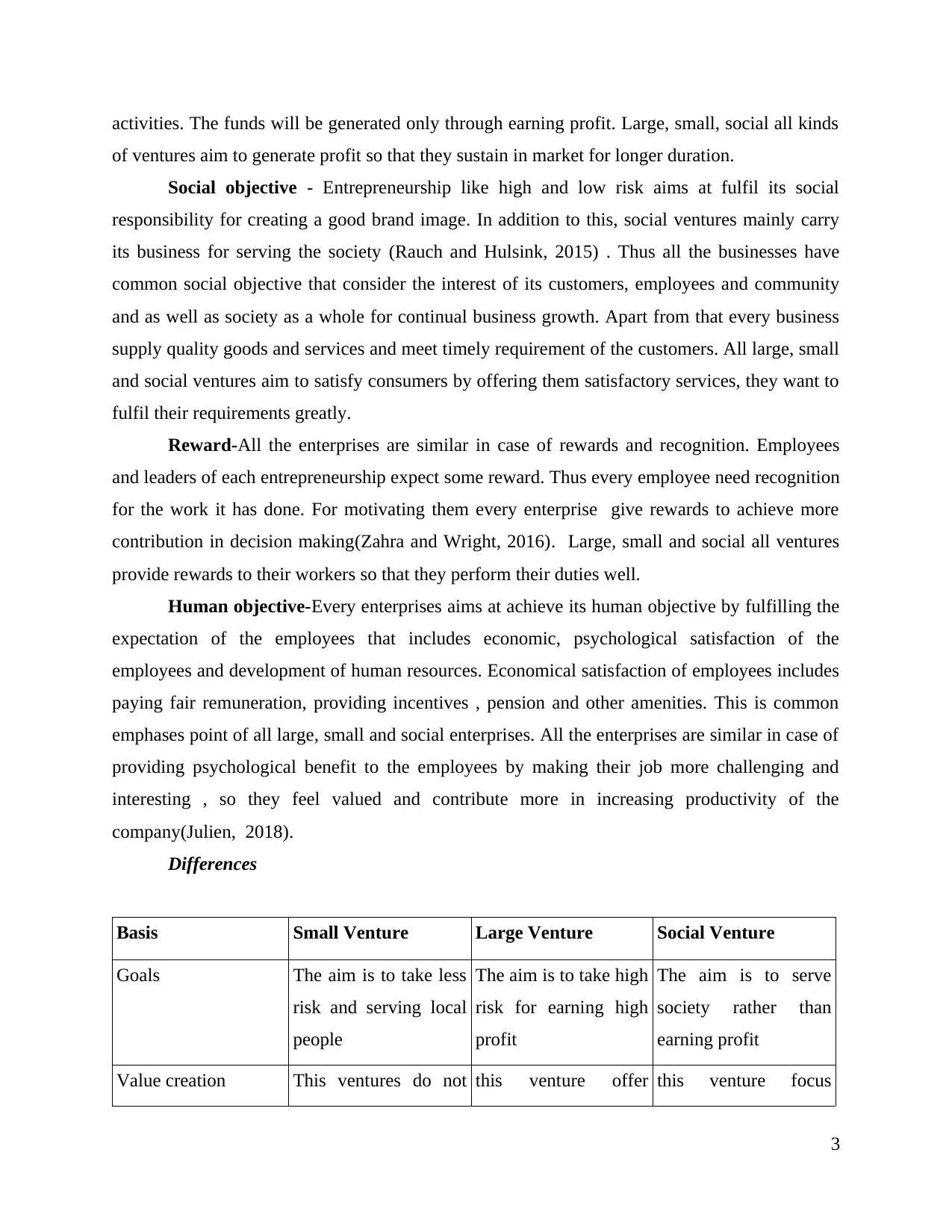
activities. The funds will be generated only through earning profit. Large, small, social all kinds
of ventures aim to generate profit so that they sustain in market for longer duration.
Social objective - Entrepreneurship like high and low risk aims at fulfil its social
responsibility for creating a good brand image. In addition to this, social ventures mainly carry
its business for serving the society (Rauch and Hulsink, 2015) . Thus all the businesses have
common social objective that consider the interest of its customers, employees and community
and as well as society as a whole for continual business growth. Apart from that every business
supply quality goods and services and meet timely requirement of the customers. All large, small
and social ventures aim to satisfy consumers by offering them satisfactory services, they want to
fulfil their requirements greatly.
Reward-All the enterprises are similar in case of rewards and recognition. Employees
and leaders of each entrepreneurship expect some reward. Thus every employee need recognition
for the work it has done. For motivating them every enterprise give rewards to achieve more
contribution in decision making(Zahra and Wright, 2016). Large, small and social all ventures
provide rewards to their workers so that they perform their duties well.
Human objective-Every enterprises aims at achieve its human objective by fulfilling the
expectation of the employees that includes economic, psychological satisfaction of the
employees and development of human resources. Economical satisfaction of employees includes
paying fair remuneration, providing incentives , pension and other amenities. This is common
emphases point of all large, small and social enterprises. All the enterprises are similar in case of
providing psychological benefit to the employees by making their job more challenging and
interesting , so they feel valued and contribute more in increasing productivity of the
company(Julien, 2018).
Differences
Basis Small Venture Large Venture Social Venture
Goals The aim is to take less
risk and serving local
people
The aim is to take high
risk for earning high
profit
The aim is to serve
society rather than
earning profit
Value creation This ventures do not this venture offer this venture focus
3
of ventures aim to generate profit so that they sustain in market for longer duration.
Social objective - Entrepreneurship like high and low risk aims at fulfil its social
responsibility for creating a good brand image. In addition to this, social ventures mainly carry
its business for serving the society (Rauch and Hulsink, 2015) . Thus all the businesses have
common social objective that consider the interest of its customers, employees and community
and as well as society as a whole for continual business growth. Apart from that every business
supply quality goods and services and meet timely requirement of the customers. All large, small
and social ventures aim to satisfy consumers by offering them satisfactory services, they want to
fulfil their requirements greatly.
Reward-All the enterprises are similar in case of rewards and recognition. Employees
and leaders of each entrepreneurship expect some reward. Thus every employee need recognition
for the work it has done. For motivating them every enterprise give rewards to achieve more
contribution in decision making(Zahra and Wright, 2016). Large, small and social all ventures
provide rewards to their workers so that they perform their duties well.
Human objective-Every enterprises aims at achieve its human objective by fulfilling the
expectation of the employees that includes economic, psychological satisfaction of the
employees and development of human resources. Economical satisfaction of employees includes
paying fair remuneration, providing incentives , pension and other amenities. This is common
emphases point of all large, small and social enterprises. All the enterprises are similar in case of
providing psychological benefit to the employees by making their job more challenging and
interesting , so they feel valued and contribute more in increasing productivity of the
company(Julien, 2018).
Differences
Basis Small Venture Large Venture Social Venture
Goals The aim is to take less
risk and serving local
people
The aim is to take high
risk for earning high
profit
The aim is to serve
society rather than
earning profit
Value creation This ventures do not this venture offer this venture focus
3

aims to provide value
rather than it focus on
satisfying need of local
demand
products with value
addition to provide
innovative products
primarily on social
value creation through
positive impact on
target audience
Marketing
communication
These venture
generally do marketing
communication
through print media or
pamphlets
These venture needs
TV advertisement ,
internet ads. to
communicate about its
product with large
audience.(Julien,
2018)
These enterprises use
word of mouth
marketing to reach the
masses.
Perception of Value In these enterprises
value lies in fulfilling
own personal goals
Here value lies in the
profit that
entrepreneur and
investor are expecting
from its value creation
Value for these
enterprises lies in
social benefit to the
community or
transformation of the
community that has
lack of resources to
fulfil own need
Approach of wealth
creation
It create wealth
through introducing its
product in local market
It will create wealth by
offering innovation in
commercial market.
(Julien, 2018)
here wealth creation is
not necessary for Own
sake but wealth is
simply a tool that
entrepreneur uses to
make social changes
LO2
P3 Impact of micro and small business on the economy with statistics
Small business are such enterprises which hires less than 50 employees and has turnover of
under 10 million. Whereas micro firms are such ventures that hires 10 employees or less than
4
rather than it focus on
satisfying need of local
demand
products with value
addition to provide
innovative products
primarily on social
value creation through
positive impact on
target audience
Marketing
communication
These venture
generally do marketing
communication
through print media or
pamphlets
These venture needs
TV advertisement ,
internet ads. to
communicate about its
product with large
audience.(Julien,
2018)
These enterprises use
word of mouth
marketing to reach the
masses.
Perception of Value In these enterprises
value lies in fulfilling
own personal goals
Here value lies in the
profit that
entrepreneur and
investor are expecting
from its value creation
Value for these
enterprises lies in
social benefit to the
community or
transformation of the
community that has
lack of resources to
fulfil own need
Approach of wealth
creation
It create wealth
through introducing its
product in local market
It will create wealth by
offering innovation in
commercial market.
(Julien, 2018)
here wealth creation is
not necessary for Own
sake but wealth is
simply a tool that
entrepreneur uses to
make social changes
LO2
P3 Impact of micro and small business on the economy with statistics
Small business are such enterprises which hires less than 50 employees and has turnover of
under 10 million. Whereas micro firms are such ventures that hires 10 employees or less than
4
⊘ This is a preview!⊘
Do you want full access?
Subscribe today to unlock all pages.

Trusted by 1+ million students worldwide
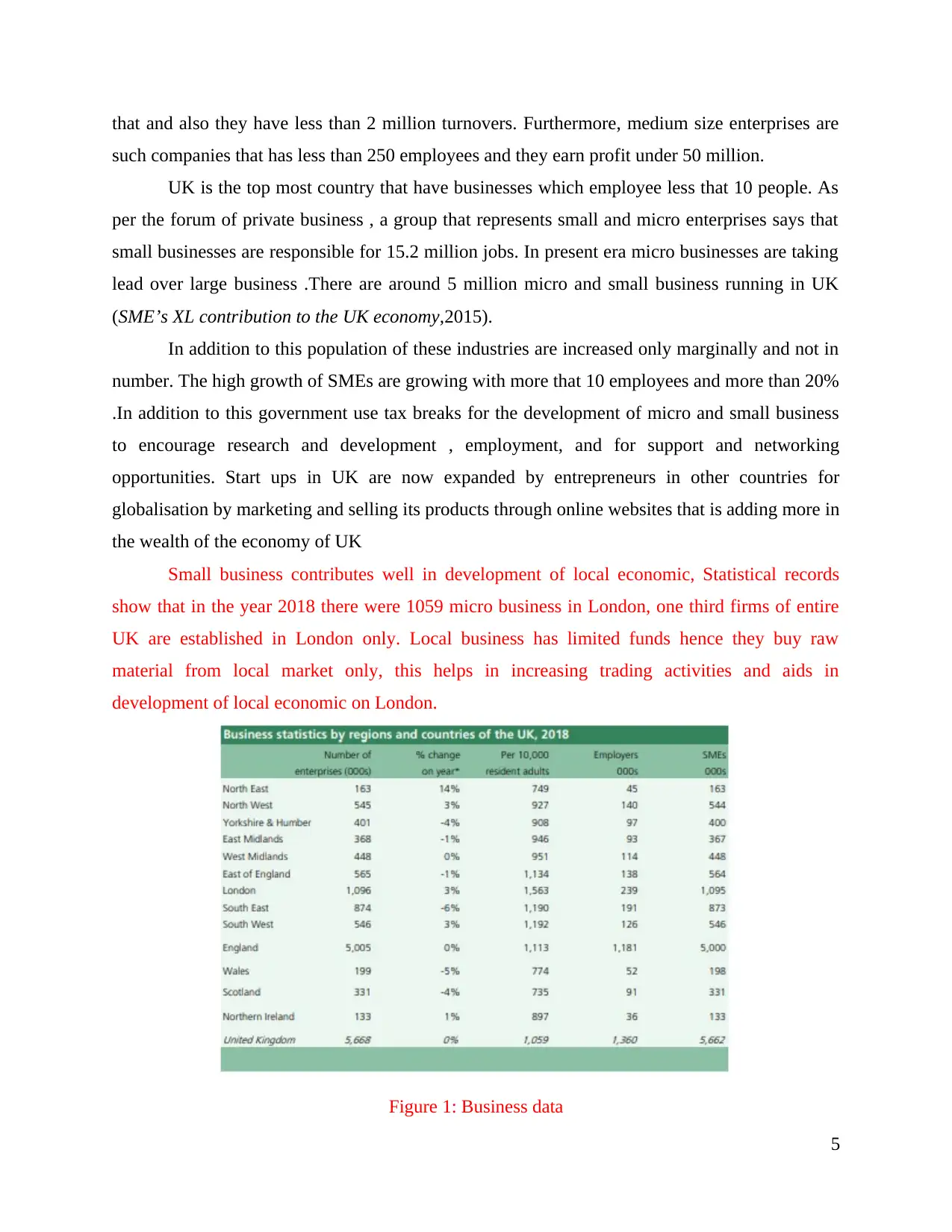
that and also they have less than 2 million turnovers. Furthermore, medium size enterprises are
such companies that has less than 250 employees and they earn profit under 50 million.
UK is the top most country that have businesses which employee less that 10 people. As
per the forum of private business , a group that represents small and micro enterprises says that
small businesses are responsible for 15.2 million jobs. In present era micro businesses are taking
lead over large business .There are around 5 million micro and small business running in UK
(SME’s XL contribution to the UK economy,2015).
In addition to this population of these industries are increased only marginally and not in
number. The high growth of SMEs are growing with more that 10 employees and more than 20%
.In addition to this government use tax breaks for the development of micro and small business
to encourage research and development , employment, and for support and networking
opportunities. Start ups in UK are now expanded by entrepreneurs in other countries for
globalisation by marketing and selling its products through online websites that is adding more in
the wealth of the economy of UK
Small business contributes well in development of local economic, Statistical records
show that in the year 2018 there were 1059 micro business in London, one third firms of entire
UK are established in London only. Local business has limited funds hence they buy raw
material from local market only, this helps in increasing trading activities and aids in
development of local economic on London.
Figure 1: Business data
5
such companies that has less than 250 employees and they earn profit under 50 million.
UK is the top most country that have businesses which employee less that 10 people. As
per the forum of private business , a group that represents small and micro enterprises says that
small businesses are responsible for 15.2 million jobs. In present era micro businesses are taking
lead over large business .There are around 5 million micro and small business running in UK
(SME’s XL contribution to the UK economy,2015).
In addition to this population of these industries are increased only marginally and not in
number. The high growth of SMEs are growing with more that 10 employees and more than 20%
.In addition to this government use tax breaks for the development of micro and small business
to encourage research and development , employment, and for support and networking
opportunities. Start ups in UK are now expanded by entrepreneurs in other countries for
globalisation by marketing and selling its products through online websites that is adding more in
the wealth of the economy of UK
Small business contributes well in development of local economic, Statistical records
show that in the year 2018 there were 1059 micro business in London, one third firms of entire
UK are established in London only. Local business has limited funds hence they buy raw
material from local market only, this helps in increasing trading activities and aids in
development of local economic on London.
Figure 1: Business data
5
Paraphrase This Document
Need a fresh take? Get an instant paraphrase of this document with our AI Paraphraser
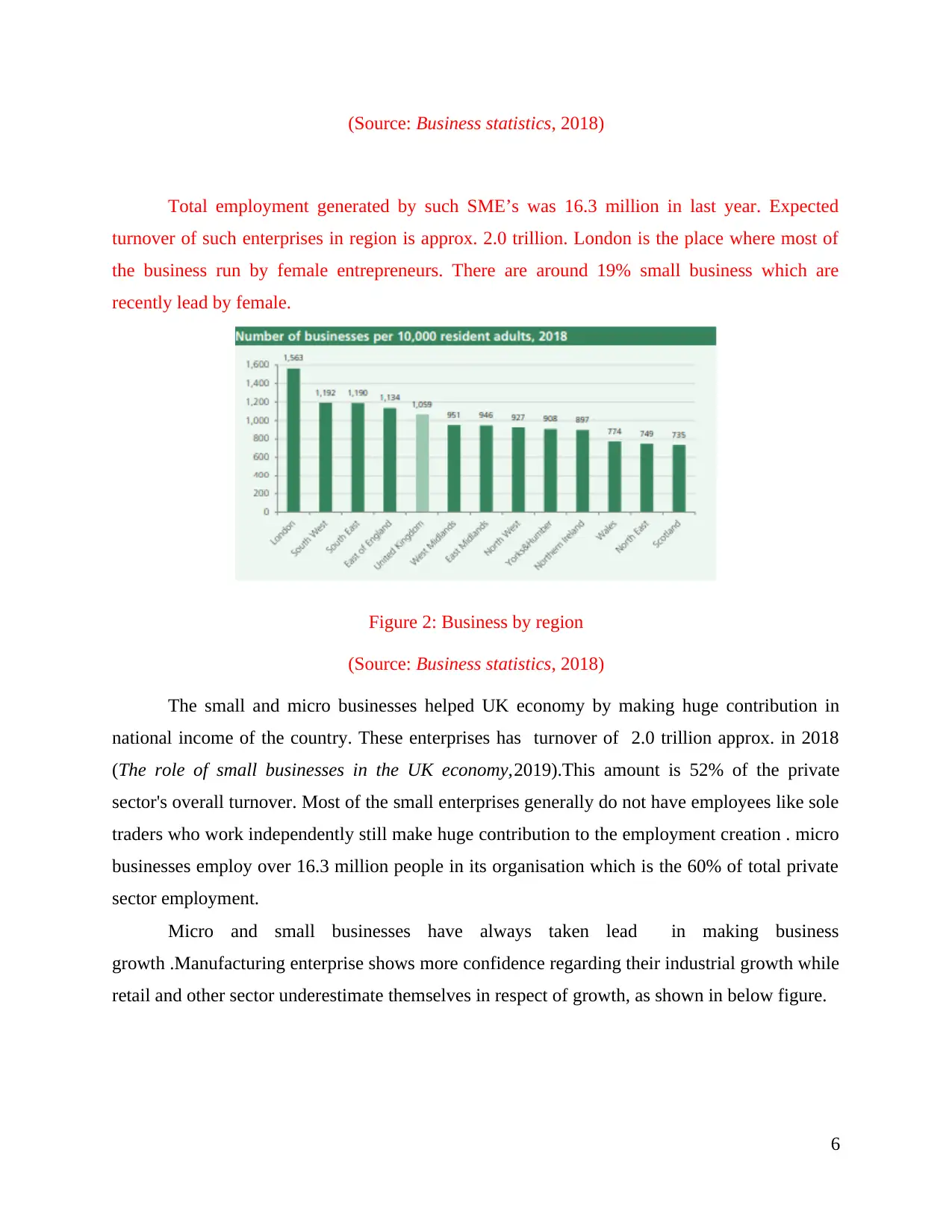
(Source: Business statistics, 2018)
Total employment generated by such SME’s was 16.3 million in last year. Expected
turnover of such enterprises in region is approx. 2.0 trillion. London is the place where most of
the business run by female entrepreneurs. There are around 19% small business which are
recently lead by female.
Figure 2: Business by region
(Source: Business statistics, 2018)
The small and micro businesses helped UK economy by making huge contribution in
national income of the country. These enterprises has turnover of 2.0 trillion approx. in 2018
(The role of small businesses in the UK economy,2019).This amount is 52% of the private
sector's overall turnover. Most of the small enterprises generally do not have employees like sole
traders who work independently still make huge contribution to the employment creation . micro
businesses employ over 16.3 million people in its organisation which is the 60% of total private
sector employment.
Micro and small businesses have always taken lead in making business
growth .Manufacturing enterprise shows more confidence regarding their industrial growth while
retail and other sector underestimate themselves in respect of growth, as shown in below figure.
6
Total employment generated by such SME’s was 16.3 million in last year. Expected
turnover of such enterprises in region is approx. 2.0 trillion. London is the place where most of
the business run by female entrepreneurs. There are around 19% small business which are
recently lead by female.
Figure 2: Business by region
(Source: Business statistics, 2018)
The small and micro businesses helped UK economy by making huge contribution in
national income of the country. These enterprises has turnover of 2.0 trillion approx. in 2018
(The role of small businesses in the UK economy,2019).This amount is 52% of the private
sector's overall turnover. Most of the small enterprises generally do not have employees like sole
traders who work independently still make huge contribution to the employment creation . micro
businesses employ over 16.3 million people in its organisation which is the 60% of total private
sector employment.
Micro and small businesses have always taken lead in making business
growth .Manufacturing enterprise shows more confidence regarding their industrial growth while
retail and other sector underestimate themselves in respect of growth, as shown in below figure.
6
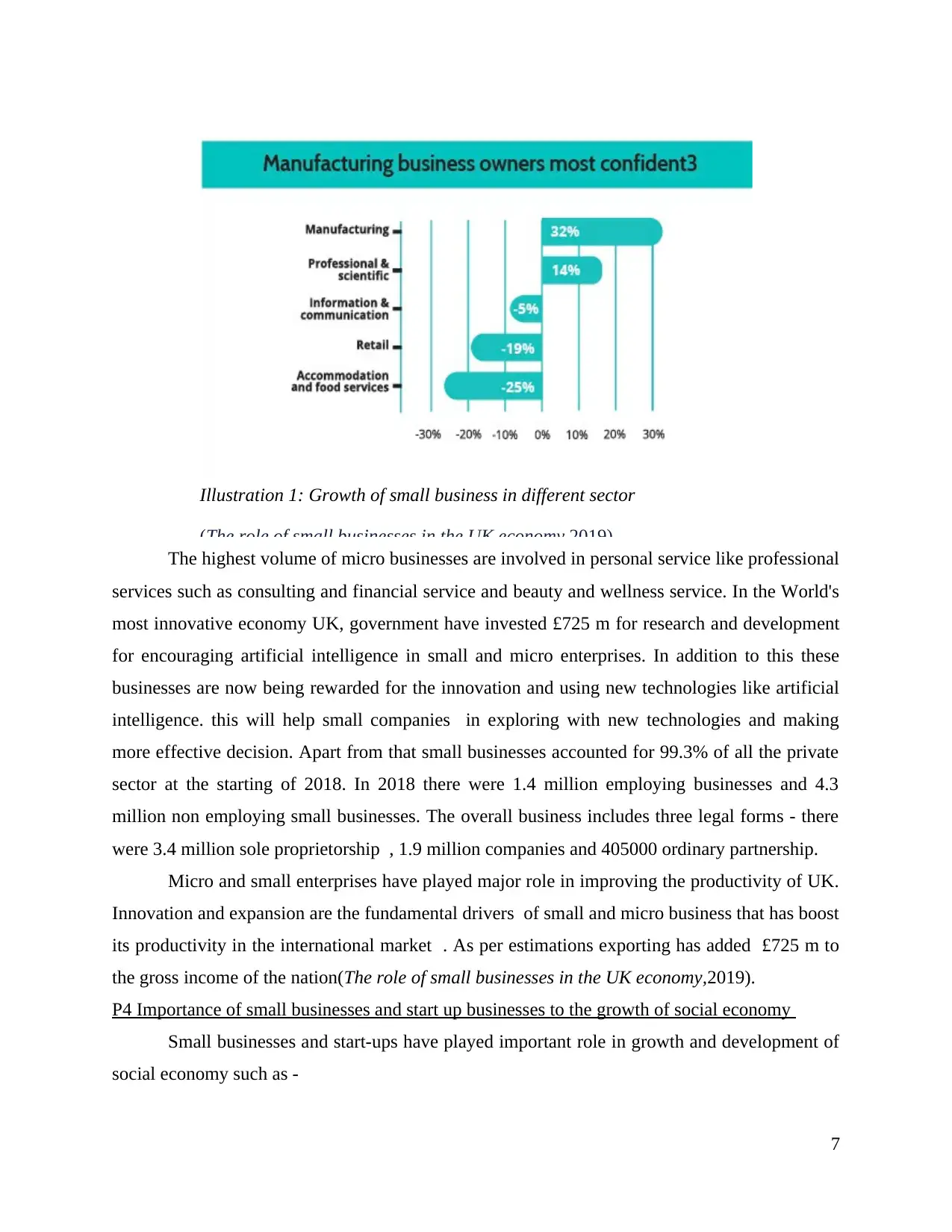
The highest volume of micro businesses are involved in personal service like professional
services such as consulting and financial service and beauty and wellness service. In the World's
most innovative economy UK, government have invested £725 m for research and development
for encouraging artificial intelligence in small and micro enterprises. In addition to this these
businesses are now being rewarded for the innovation and using new technologies like artificial
intelligence. this will help small companies in exploring with new technologies and making
more effective decision. Apart from that small businesses accounted for 99.3% of all the private
sector at the starting of 2018. In 2018 there were 1.4 million employing businesses and 4.3
million non employing small businesses. The overall business includes three legal forms - there
were 3.4 million sole proprietorship , 1.9 million companies and 405000 ordinary partnership.
Micro and small enterprises have played major role in improving the productivity of UK.
Innovation and expansion are the fundamental drivers of small and micro business that has boost
its productivity in the international market . As per estimations exporting has added £725 m to
the gross income of the nation(The role of small businesses in the UK economy,2019).
P4 Importance of small businesses and start up businesses to the growth of social economy
Small businesses and start-ups have played important role in growth and development of
social economy such as -
7
Illustration 1: Growth of small business in different sector
(The role of small businesses in the UK economy,2019)
services such as consulting and financial service and beauty and wellness service. In the World's
most innovative economy UK, government have invested £725 m for research and development
for encouraging artificial intelligence in small and micro enterprises. In addition to this these
businesses are now being rewarded for the innovation and using new technologies like artificial
intelligence. this will help small companies in exploring with new technologies and making
more effective decision. Apart from that small businesses accounted for 99.3% of all the private
sector at the starting of 2018. In 2018 there were 1.4 million employing businesses and 4.3
million non employing small businesses. The overall business includes three legal forms - there
were 3.4 million sole proprietorship , 1.9 million companies and 405000 ordinary partnership.
Micro and small enterprises have played major role in improving the productivity of UK.
Innovation and expansion are the fundamental drivers of small and micro business that has boost
its productivity in the international market . As per estimations exporting has added £725 m to
the gross income of the nation(The role of small businesses in the UK economy,2019).
P4 Importance of small businesses and start up businesses to the growth of social economy
Small businesses and start-ups have played important role in growth and development of
social economy such as -
7
Illustration 1: Growth of small business in different sector
(The role of small businesses in the UK economy,2019)
⊘ This is a preview!⊘
Do you want full access?
Subscribe today to unlock all pages.

Trusted by 1+ million students worldwide
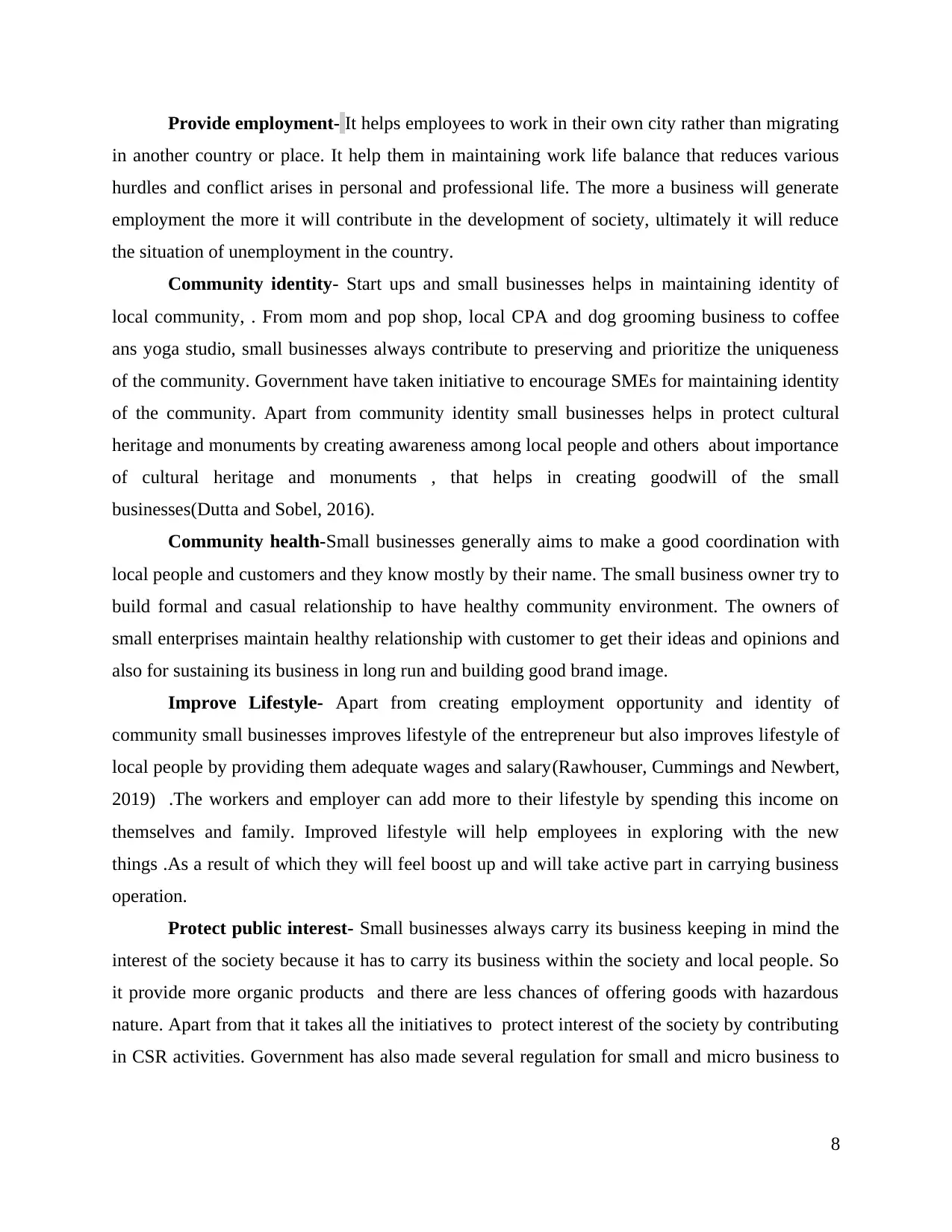
Provide employment- It helps employees to work in their own city rather than migrating
in another country or place. It help them in maintaining work life balance that reduces various
hurdles and conflict arises in personal and professional life. The more a business will generate
employment the more it will contribute in the development of society, ultimately it will reduce
the situation of unemployment in the country.
Community identity- Start ups and small businesses helps in maintaining identity of
local community, . From mom and pop shop, local CPA and dog grooming business to coffee
ans yoga studio, small businesses always contribute to preserving and prioritize the uniqueness
of the community. Government have taken initiative to encourage SMEs for maintaining identity
of the community. Apart from community identity small businesses helps in protect cultural
heritage and monuments by creating awareness among local people and others about importance
of cultural heritage and monuments , that helps in creating goodwill of the small
businesses(Dutta and Sobel, 2016).
Community health-Small businesses generally aims to make a good coordination with
local people and customers and they know mostly by their name. The small business owner try to
build formal and casual relationship to have healthy community environment. The owners of
small enterprises maintain healthy relationship with customer to get their ideas and opinions and
also for sustaining its business in long run and building good brand image.
Improve Lifestyle- Apart from creating employment opportunity and identity of
community small businesses improves lifestyle of the entrepreneur but also improves lifestyle of
local people by providing them adequate wages and salary(Rawhouser, Cummings and Newbert,
2019) .The workers and employer can add more to their lifestyle by spending this income on
themselves and family. Improved lifestyle will help employees in exploring with the new
things .As a result of which they will feel boost up and will take active part in carrying business
operation.
Protect public interest- Small businesses always carry its business keeping in mind the
interest of the society because it has to carry its business within the society and local people. So
it provide more organic products and there are less chances of offering goods with hazardous
nature. Apart from that it takes all the initiatives to protect interest of the society by contributing
in CSR activities. Government has also made several regulation for small and micro business to
8
in another country or place. It help them in maintaining work life balance that reduces various
hurdles and conflict arises in personal and professional life. The more a business will generate
employment the more it will contribute in the development of society, ultimately it will reduce
the situation of unemployment in the country.
Community identity- Start ups and small businesses helps in maintaining identity of
local community, . From mom and pop shop, local CPA and dog grooming business to coffee
ans yoga studio, small businesses always contribute to preserving and prioritize the uniqueness
of the community. Government have taken initiative to encourage SMEs for maintaining identity
of the community. Apart from community identity small businesses helps in protect cultural
heritage and monuments by creating awareness among local people and others about importance
of cultural heritage and monuments , that helps in creating goodwill of the small
businesses(Dutta and Sobel, 2016).
Community health-Small businesses generally aims to make a good coordination with
local people and customers and they know mostly by their name. The small business owner try to
build formal and casual relationship to have healthy community environment. The owners of
small enterprises maintain healthy relationship with customer to get their ideas and opinions and
also for sustaining its business in long run and building good brand image.
Improve Lifestyle- Apart from creating employment opportunity and identity of
community small businesses improves lifestyle of the entrepreneur but also improves lifestyle of
local people by providing them adequate wages and salary(Rawhouser, Cummings and Newbert,
2019) .The workers and employer can add more to their lifestyle by spending this income on
themselves and family. Improved lifestyle will help employees in exploring with the new
things .As a result of which they will feel boost up and will take active part in carrying business
operation.
Protect public interest- Small businesses always carry its business keeping in mind the
interest of the society because it has to carry its business within the society and local people. So
it provide more organic products and there are less chances of offering goods with hazardous
nature. Apart from that it takes all the initiatives to protect interest of the society by contributing
in CSR activities. Government has also made several regulation for small and micro business to
8
Paraphrase This Document
Need a fresh take? Get an instant paraphrase of this document with our AI Paraphraser
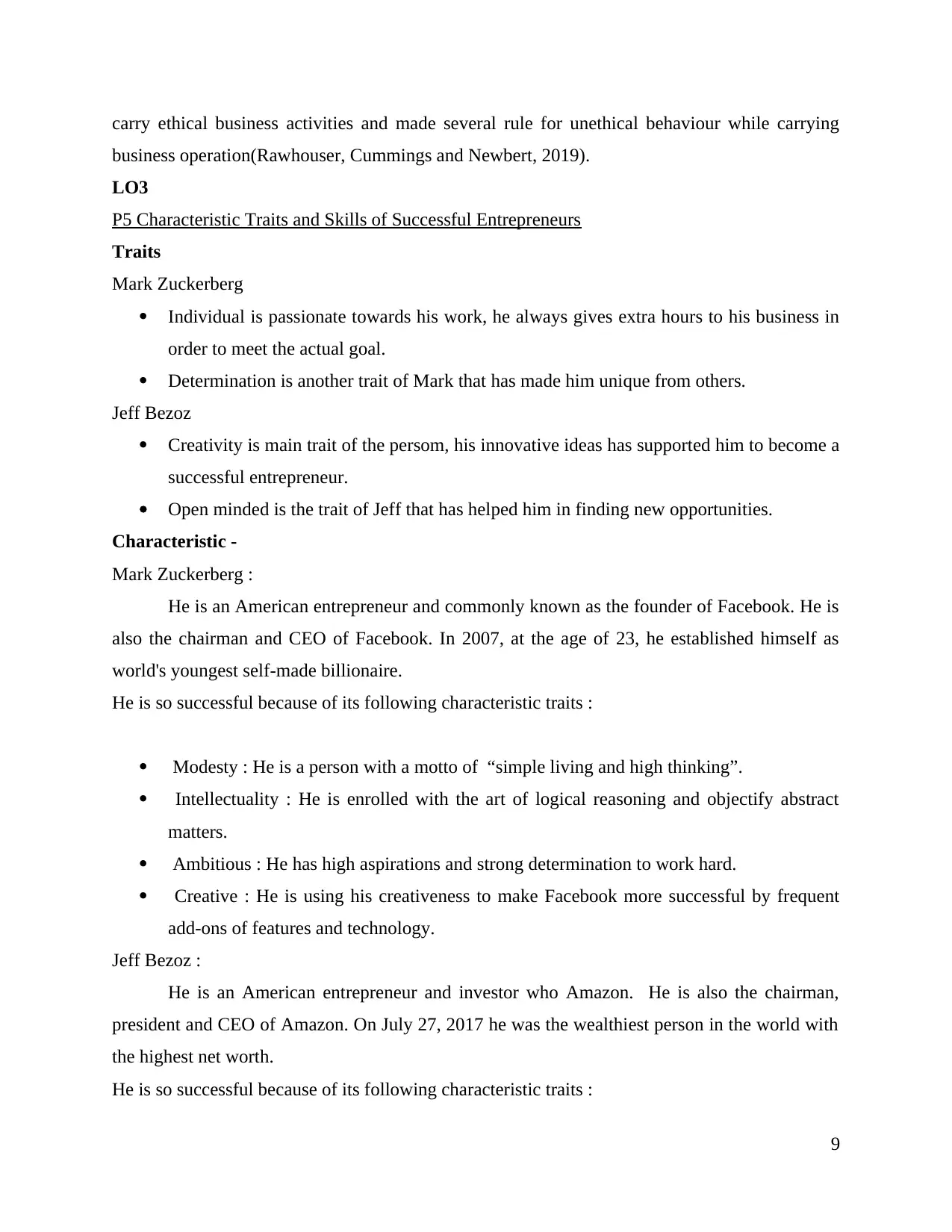
carry ethical business activities and made several rule for unethical behaviour while carrying
business operation(Rawhouser, Cummings and Newbert, 2019).
LO3
P5 Characteristic Traits and Skills of Successful Entrepreneurs
Traits
Mark Zuckerberg
Individual is passionate towards his work, he always gives extra hours to his business in
order to meet the actual goal.
Determination is another trait of Mark that has made him unique from others.
Jeff Bezoz
Creativity is main trait of the persom, his innovative ideas has supported him to become a
successful entrepreneur.
Open minded is the trait of Jeff that has helped him in finding new opportunities.
Characteristic -
Mark Zuckerberg :
He is an American entrepreneur and commonly known as the founder of Facebook. He is
also the chairman and CEO of Facebook. In 2007, at the age of 23, he established himself as
world's youngest self-made billionaire.
He is so successful because of its following characteristic traits :
Modesty : He is a person with a motto of “simple living and high thinking”.
Intellectuality : He is enrolled with the art of logical reasoning and objectify abstract
matters.
Ambitious : He has high aspirations and strong determination to work hard.
Creative : He is using his creativeness to make Facebook more successful by frequent
add-ons of features and technology.
Jeff Bezoz :
He is an American entrepreneur and investor who Amazon. He is also the chairman,
president and CEO of Amazon. On July 27, 2017 he was the wealthiest person in the world with
the highest net worth.
He is so successful because of its following characteristic traits :
9
business operation(Rawhouser, Cummings and Newbert, 2019).
LO3
P5 Characteristic Traits and Skills of Successful Entrepreneurs
Traits
Mark Zuckerberg
Individual is passionate towards his work, he always gives extra hours to his business in
order to meet the actual goal.
Determination is another trait of Mark that has made him unique from others.
Jeff Bezoz
Creativity is main trait of the persom, his innovative ideas has supported him to become a
successful entrepreneur.
Open minded is the trait of Jeff that has helped him in finding new opportunities.
Characteristic -
Mark Zuckerberg :
He is an American entrepreneur and commonly known as the founder of Facebook. He is
also the chairman and CEO of Facebook. In 2007, at the age of 23, he established himself as
world's youngest self-made billionaire.
He is so successful because of its following characteristic traits :
Modesty : He is a person with a motto of “simple living and high thinking”.
Intellectuality : He is enrolled with the art of logical reasoning and objectify abstract
matters.
Ambitious : He has high aspirations and strong determination to work hard.
Creative : He is using his creativeness to make Facebook more successful by frequent
add-ons of features and technology.
Jeff Bezoz :
He is an American entrepreneur and investor who Amazon. He is also the chairman,
president and CEO of Amazon. On July 27, 2017 he was the wealthiest person in the world with
the highest net worth.
He is so successful because of its following characteristic traits :
9
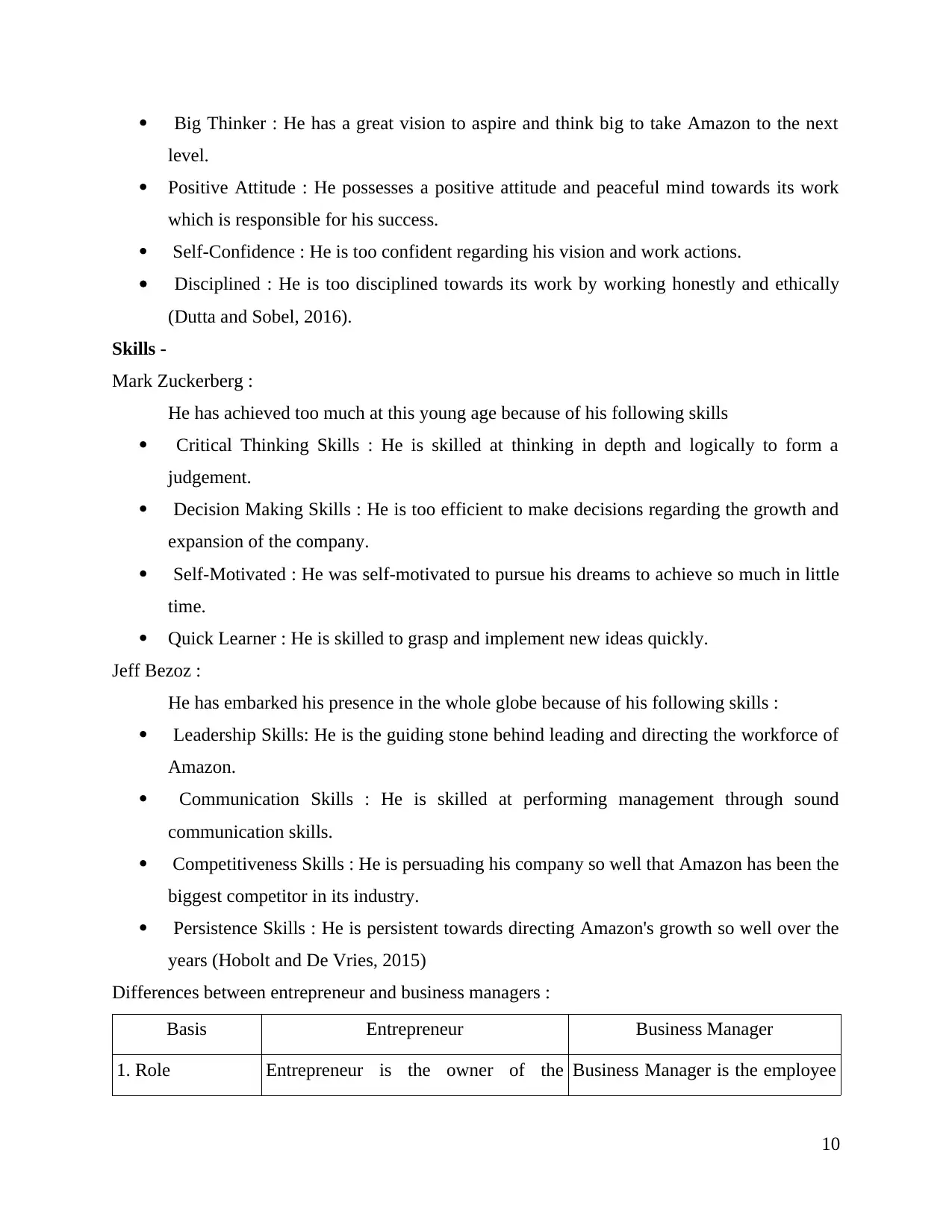
Big Thinker : He has a great vision to aspire and think big to take Amazon to the next
level.
Positive Attitude : He possesses a positive attitude and peaceful mind towards its work
which is responsible for his success.
Self-Confidence : He is too confident regarding his vision and work actions.
Disciplined : He is too disciplined towards its work by working honestly and ethically
(Dutta and Sobel, 2016).
Skills -
Mark Zuckerberg :
He has achieved too much at this young age because of his following skills
Critical Thinking Skills : He is skilled at thinking in depth and logically to form a
judgement.
Decision Making Skills : He is too efficient to make decisions regarding the growth and
expansion of the company.
Self-Motivated : He was self-motivated to pursue his dreams to achieve so much in little
time.
Quick Learner : He is skilled to grasp and implement new ideas quickly.
Jeff Bezoz :
He has embarked his presence in the whole globe because of his following skills :
Leadership Skills: He is the guiding stone behind leading and directing the workforce of
Amazon.
Communication Skills : He is skilled at performing management through sound
communication skills.
Competitiveness Skills : He is persuading his company so well that Amazon has been the
biggest competitor in its industry.
Persistence Skills : He is persistent towards directing Amazon's growth so well over the
years (Hobolt and De Vries, 2015)
Differences between entrepreneur and business managers :
Basis Entrepreneur Business Manager
1. Role Entrepreneur is the owner of the Business Manager is the employee
10
level.
Positive Attitude : He possesses a positive attitude and peaceful mind towards its work
which is responsible for his success.
Self-Confidence : He is too confident regarding his vision and work actions.
Disciplined : He is too disciplined towards its work by working honestly and ethically
(Dutta and Sobel, 2016).
Skills -
Mark Zuckerberg :
He has achieved too much at this young age because of his following skills
Critical Thinking Skills : He is skilled at thinking in depth and logically to form a
judgement.
Decision Making Skills : He is too efficient to make decisions regarding the growth and
expansion of the company.
Self-Motivated : He was self-motivated to pursue his dreams to achieve so much in little
time.
Quick Learner : He is skilled to grasp and implement new ideas quickly.
Jeff Bezoz :
He has embarked his presence in the whole globe because of his following skills :
Leadership Skills: He is the guiding stone behind leading and directing the workforce of
Amazon.
Communication Skills : He is skilled at performing management through sound
communication skills.
Competitiveness Skills : He is persuading his company so well that Amazon has been the
biggest competitor in its industry.
Persistence Skills : He is persistent towards directing Amazon's growth so well over the
years (Hobolt and De Vries, 2015)
Differences between entrepreneur and business managers :
Basis Entrepreneur Business Manager
1. Role Entrepreneur is the owner of the Business Manager is the employee
10
⊘ This is a preview!⊘
Do you want full access?
Subscribe today to unlock all pages.

Trusted by 1+ million students worldwide
1 out of 18
Related Documents
Your All-in-One AI-Powered Toolkit for Academic Success.
+13062052269
info@desklib.com
Available 24*7 on WhatsApp / Email
![[object Object]](/_next/static/media/star-bottom.7253800d.svg)
Unlock your academic potential
Copyright © 2020–2026 A2Z Services. All Rights Reserved. Developed and managed by ZUCOL.




